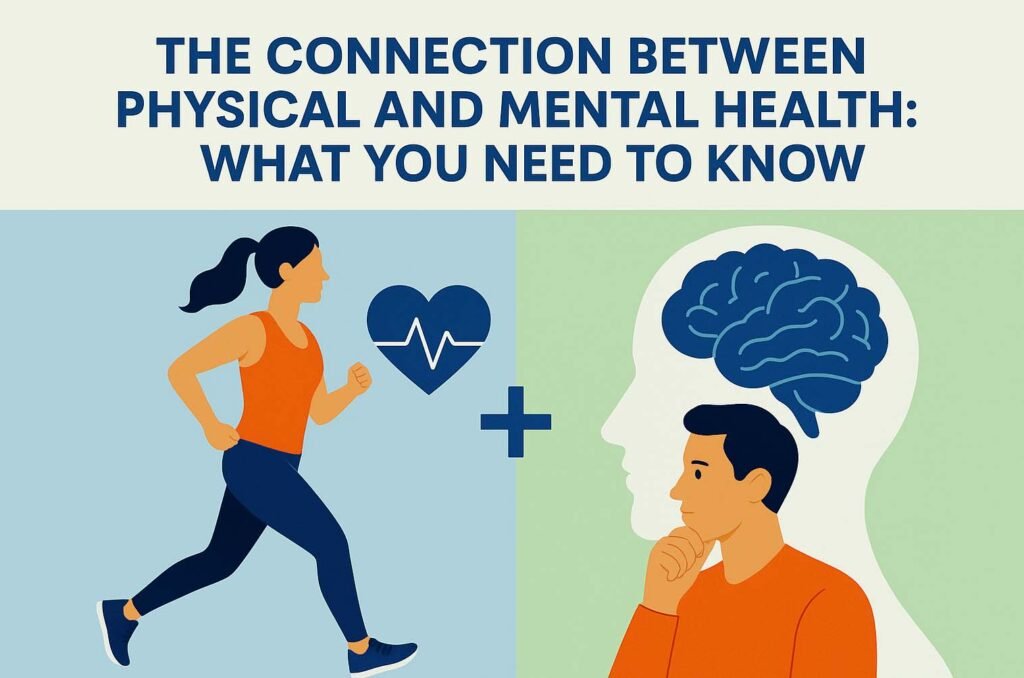
The Connection between Physical and Mental Health: What You Need to Know
In recent years, the strong relationship between physical and mental health has become a major consideration for healthcare professionals and researchers. While many people still view physical and mental health in the sense of distinct disciplines, science has shown they are deeply intertwined. Understanding how your body and mind work together can help you make smarter decisions for a healthier, more balanced life.
Understanding the Mind-Body Connection
The term mind-body connection refers to the bidirectional relationship between your thoughts, emotions, behavioral problems, and physical well-being. Your mental health can affect your physical health the same way your body’s physical condition affects your mental health.
For example, chronic stress can also increase your chances of having high blood pressure or cardiovascular disease. All in all, conditions like chronic pain or obesity can lead to anxiety or depression. The interdependence is undeniable.
How Physical Health Impacts Mental Well-Being
- Exercise Boosts Brain Function and Mood
There ‘s a good deal of evidence that regular exercise prevents the symptoms of depression and anxiety from worsening..
Scientific Insight:
A landmark study published in the Journal of Psychiatric Research (2018) found that people who exercised regularly were 43 percent less likely to develop depression, even when accounting for genetic predisposition.
Why it Works:
Exercise increases the production of endorphins and neurotransmitters like serotonin and dopamine. These two chemicals have a big part to play in mood regulation.
- Chronic Illness and Psychological Stress
Chronic physical illnesses such as diabetes, cardiovascular disease, and arthritis can lead to mental health complications. People who live with pain, fatigue, or disability often feel higher levels of stress, anxiety, or depression.
Research Evidence:
The World Health Organization (WHO) reports that people with chronic physical conditions are two to three times more likely to experience depression compared to those without.
Underlying Mechanism:
Chronic inflammation and hormonal imbalances (e.g., cortisol dysregulation) may affect brain function and contribute to emotional distress.
How Mental Health Influences Physical Health
- Stress and the Immune System
Psychological stress can also decrease one ‘s immune system, which makes one more vulnerable to infection and sickness.
Scientific Insight:
According to research from Psychological Bulletin (2004), chronic stress changes immune responses and is tied to slower wound healing, increased susceptibility to colds, and more severe autoimmune responses.
- Depression and Heart Disease
Mental disorders, particularly depression, have been linked with cardiovascular disease.
Study Highlight:
A meta-analysis published in the Journal of the American Medical Association (JAMA, 2005) found that depression increases the risk of developing coronary heart disease by 64%.
Explanation:
Depression can also lead to bad dietary habits, low exercise level and smoking. And at a biological level depression is thought to cause higher blood pressure and more inflammation..
The Role of Sleep in Mind-Body Health
Sleep is a foundational pillar that supports your physical and mental health. Lack of sleep is associated with many kinds of health problems, from heart disease to anxiety disorders.
Scientific Evidence:
The Sleep Health Journal (2017) explains that individuals with insomnia or sleep deprivation show greater activity in brain regions involved in emotional regulation, leading to heightened anxiety and irritability. Mental illnesses are often accompanied by disturbed sleeping patterns which serve to perpetuate the cycle.
Nutrition’s Impact on Mental Health
The food you eat doesn’t just affect your waistline—it also affects your brain.
The Gut-Brain Axis:
Gut health has a direct impact on mental well-being, new research shows. The microbiome (bacteria in the gut) communicates with the brain via the vagus nerve and impacts mood and cognition.
Scientific Insight:
A 2017 review in Nutritional Neuroscience suggests that diets high in fruits, vegetables, omega-3 fatty acids, and whole grains are associated with a reduced risk of depression and anxiety.
Integrated Approaches to Health
Because of this mind-body relationship, many healthcare systems are shifting toward integrated care—where mental and physical health services are coordinated.
Examples of Integrated Care:
- Cognitive Behavioral Therapy (CBT) for managing chronic pain
- Exercise prescriptions from mental health providers
- Stress-reduction techniques (like meditation) used to treat hypertension
Practical Tips for Supporting Both Physical and Mental Health
Exercise Regularly:
It ‘s estimated that you should get at least 150 minutes of moderate aerobic exercise each week.
Eat a Balanced Diet:
Buy whole, nutritionally dense foods for both body and brain.
Get Quality Sleep:
Prioritize 7–9 hours of uninterrupted sleep nightly.
Manage Stress:
Use relaxation techniques such as mindfulness, yoga, or breathing exercises.
Seek Social Support:
Healthy social connections are an important part of emotional well-being and overall physical health.
Limit Alcohol and Reduce Smoking:
Both have links to increased risk for psychological and physical illness.
Stay Proactive About Health:
Don’t ignore physical symptoms or emotional distress—early intervention matters.
